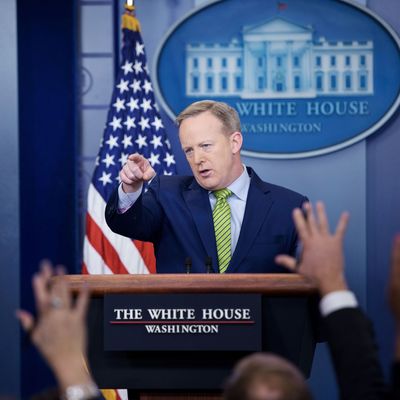
White House Press Secretary Sean Spicer followed the leads of President Trump and National Security Adviser Mike Flynn Thursday when he warned Iran that it is “on notice” for a recent ballistic missile test. Then Spicer mentioned another Iranian transgression: the “actions that it took against our Navy vessel.” Only, that never happened.
Spicer is likely referring to an attack on Monday on a Saudi frigate, which was not carried out by Iran. Rather, the Pentagon tells the Intercept, Houthi rebels, an Iranian-backed group fighting in Yemen, are the prime suspects. To recap: It wasn’t a U.S. ship and the attackers weren’t Iranians.
Spicer’s comments come a day after Flynn put Iran “on notice” for the ballistic missile test, and hours after President Trump did the same on Twitter.
Flynn’s remarks were delivered Wednesday in the White House briefing room, where he called the missile test a violation of the 2015 United Nations resolution that “called upon” Iran to cease “any activity related to ballistic missiles designed to be capable of delivering nuclear weapons.”
Though Flynn did not lay out how the U.S. might respond to Iran, an administration official told CNN, “We are considering a whole range of options. We’re in a deliberative process.”
Iran responded Thursday with little more than a shrug. The nation maintains that it did not violate the U.N. resolution and Ali Akbar Velayati, a top adviser to Ayatollah Ali Khamenei, said, “threatening Iran is useless.”
“This is not the first time that an inexperienced person has threatened Iran,” Velayati told the Fars News Agency, often described as the “semi-official” outlet of Iran’s government. “Iran is the strongest power in the region and has a lot of political, economic, and military power … America should be careful about making empty threats to Iran.”
He went on to say that Iran will continue testing “capabilities in ballistic missiles” and “will not ask any country for permission in defending itself.”
Trump’s first Iran tweet this morning was quickly followed by another implying that the nation would have collapsed without the assets that were unfrozen as part of the 2015 nuclear deal. In his tweet, Trump misstates both the amount of money and wrongly suggests the U.S. cut Iran a check.
Of course, there’s more wrong with that tweet than the misstated facts. For starters, Iran’s collapse would be very bad, further destabilizing the Middle East and removing one of the region’s foremost enemies of ISIS. Also, the idea that Iran was “on its last legs” appears to have come from the same place as so many other claims Trump makes: his imagination.





























